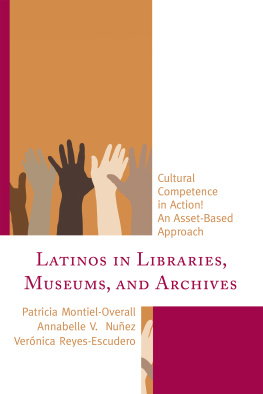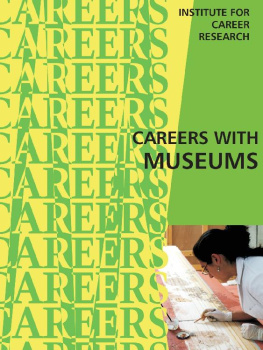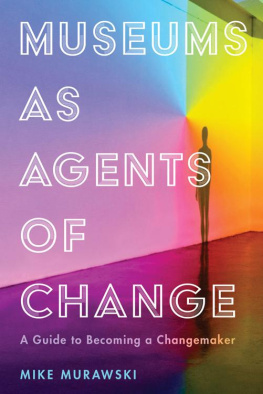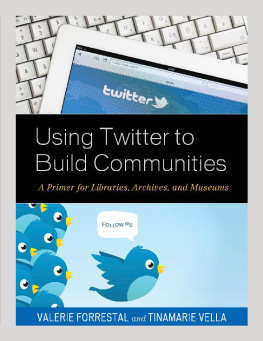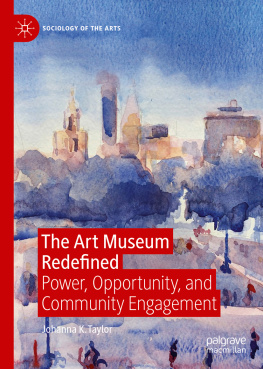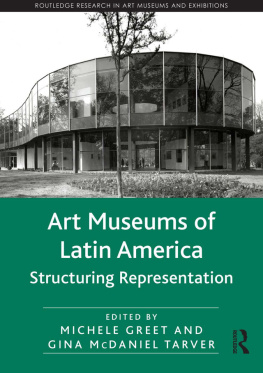
MUSEUMS INVOLVING COMMUNITIES
Museums Involving Communities: Authentic Connections explores how museums can become more active and also considers how they might involve members of their local communities in their everyday work.
Examining the key components of the museumcommunity relationship, this book looks at both the impact of museums on the cultural and civic lives of local communities and the impact of local communities on the programs, collections, and organizational culture of museums. Advocating an accessible and inclusive approach to museum management, Kadoyama focuses on the role of museum leadership in fostering and deepening community relationships. The result offers insights into how relationships between communities and museums can be forged in practice, how museums can be involved in building healthier communities, and how community engagement strategies can be developed, implemented, and evaluated successfully.
Written by an experienced museum professional with extensive experience in community involvement and audience development, Museums Involving Communities is key reading for museum workers looking to make an impact, while building long-term relations with local communities, to the benefit of both museum and community. It should also be of great interest to students taking courses in museum and heritage studies.
Margaret Kadoyama has over thirty-five years of experience in the museum profession. She is a faculty member at John F. Kennedy University, USA, and principal of Margaret Kadoyama Consulting, a consultancy specializing in community engagement and audience development.
MUSEUMS INVOLVING COMMUNITIES
Authentic Connections
Margaret Kadoyama
First published 2018
by Routledge
711 Third Avenue, New York, NY 10017
and by Routledge
2 Park Square, Milton Park, Abingdon, Oxon, OX14 4RN
Routledge is an imprint of the Taylor & Francis Group, an informa business
2018 Taylor & Francis
The right of Margaret Kadoyama to be identified as author of this work has been asserted by her in accordance with sections 77 and 78 of the Copyright, Designs and Patents Act 1988.
All rights reserved. No part of this book may be reprinted or reproduced or utilised in any form or by any electronic, mechanical, or other means, now known or hereafter invented, including photocopying and recording, or in any information storage or retrieval system, without permission in writing from the publishers.
Trademark notice: Product or corporate names may be trademarks or registered trademarks, and are used only for identification and explanation without intent to infringe.
Library of Congress Cataloging-in-Publication Data
A catalog record for this book has been requested
ISBN: 978-0-8153-8459-5 (hbk)
ISBN: 978-1-62958-494-2 (pbk)
ISBN: 978-1-351-20399-9 (ebk)
Typeset in Bembo
by Keystroke, Neville Lodge, Tettenhall, Wolverhampton
CONTENTS
PART I
Community
PART II
Creating a Community Involvement Action Plan
PART III
Challenges, Outcomes, Impacts, and Accountability
This book is the result of a long commitment to teaching and the quiet but tenacious goal of helping people learn how museums can be vital members of their communities. Since the late 1980s I have been committed to this vision, and when I was asked to teach at John F. Kennedy University Museum Studies in 1997, I hoped that this was a way to influence many students over many years to embrace and incorporate community involvement into their daily practice. It has been a great pleasure to see hundreds of JFKU students embracing community work and joining with colleagues in moving this forward. To my delight, the museum field has grown and is increasingly embracing community-focused work.
The seed for this book came from a simple question. Mitch Allen, Left Coast Presss publisher, asked me, When are you going to write a book for me? You can use your course syllabus as your guide. Mitchs clear and simple suggestion provided the spark. My twenty years of teaching Museums and Communities at JFKU has provided a considerable amount of content, and my students and their work have inspired this book. The course was the launching point for organizing and considering what to include and what new insights shine a light on this work. Later that year, when Left Coast Press retired and the book came under the purview of Routledge, I had the good fortune to work with Routledges team.
This book results from years of being a practitioner and teacher, focusing on museums and cultural organizations being involved with their communities. I launched my work with JFKU in 1997, when Marjorie Schwarzer, then chair of the department, invited me to teach the Museums and Diversity course. I changed it slightly, to focus on how I like to describe the work: Museums and Diverse Communities.
In writing a book that is based on the value of inclusion, the question of what to include and what not to include was a constant consideration. A great number of people in many fields people skilled in community activism, planners, practitioners, museum leaders, and foundations focus on inclusion and community involvement. This book includes those contributions that provide the most interesting perspective to illustrate specific elements. As a result, many important contributions are not included or highlighted.
At this time and place (the United States in 2017), colleagues in many museums and cultural organizations are articulating the importance of being inclusive. John Dichtl, president and CEO of the American Association for State and Local History, wrote in a letter to the field on November 21, 2016, AASLH will strive for inclusivity and urge its members to be even better at telling the full range of stories about our collective past. Laura Lott, president and CEO of the American Alliance of Museums, wrote in a statement on the travel ban imposed by Executive Order in January 2017,
The American Alliance of Museums strongly believes in active participation in the global community and in welcoming international perspectives. We seek out and embrace a diversity of people and cultures to enhance our understanding of the world and to connect museums in a global context, as outlined in the Alliances strategic plan.
Lastly, as I was editing the first draft of this book, my colleague Leslie Bedford asked:
Why are some museums comfortable and successful at embracing community and others not? How is that culture of inclusion created and sustained?
This book hopes to help you find out.
Bibliography
Dichtl, J. (2016, November 21). Letter from the president: Moving on from election week [Blog post]. Retrieved from http://blogs.aaslh.org/letter-from-the-president-moving-on-from-election-week/#sthash.a5voHLpy.dpuf
Lott, L. (2017, January 30). American Alliance of Museums statement on the Travel Ban imposed January 27 via Executive Order [Press release]. Retrieved from http://www.aam-us.org/about-us/media-room/2017/american-alliance-of-museums-statement-on-the-travel-ban-imposed-january-27-via-executive-order/?utm_source=MagnetMail&utm_medium=Email&utm_campaign=Aviso%3A%20Your%20AAM%20Member%20Newsletter


